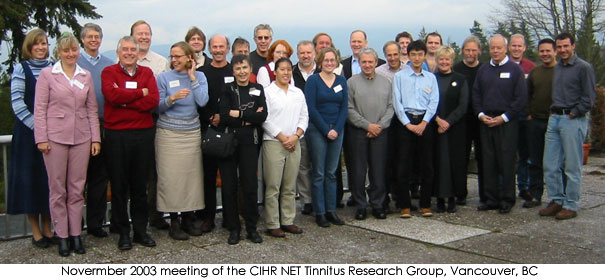

Click HERE to see highlights of our recent meeting and public forum in Vancouver, B.C.
On March 7th, 2002, the Canadian Institutes of Health Research announced funding for our five-year multi-site research project on the topic of "Understanding, Treating, and Preventing Tinnitus". Participants in the project are:



McMaster University
McMaster University
University of Calgary



University of Konstanz
Rotman Research Institute
McMaster University

University of British Columbia
What is tinnitus, and how will we address this problem?
Tinnitus is a phantom auditory sensation experienced frequently and often permanently by up to 15% of the population. In 1-2% of the general population the tinnitus sensation (typically a continuous ringing or high frequency hiss) is chronic and loud enough to affect the quality of life and lead to psychiatric distress. Although tinnitus can be induced by drugs or hearing disease, most cases are associated with hearing loss caused by noise exposure or aging. Tinnitus occurs most commonly in middle adulthood or in elderly populations, and its incidence may be increasing owing to noise exposure in our electronic and industrial era.
Recent neuroscience research is providing important insights into how hearing loss leads to the development of tinnitus. We are assembling a team of experts in auditory physiology, neural computation, human neural plasticity, brain imaging, and clinical investigation to lead a neuroscience attack on the problem of tinnitus. If we can understand how tinnitus develops when auditory input to the brain is altered by hearing injury, we may be able to design neuroplastic treatments that may ameliorate existing cases of tinnitus or prevent its development in individuals who are at risk owing to hearing impairments. We also suggest that the study of tinnitus can provide fundamental insight into how the brain reorganizes when deprived of its sensory input. The processes that are revealed may be ubiquitous in the brain and underlie other phantom phenomena such as phantom limb sensations in amputees that are not normally thought of in relation to tinnitus but may share some of its functional properties.